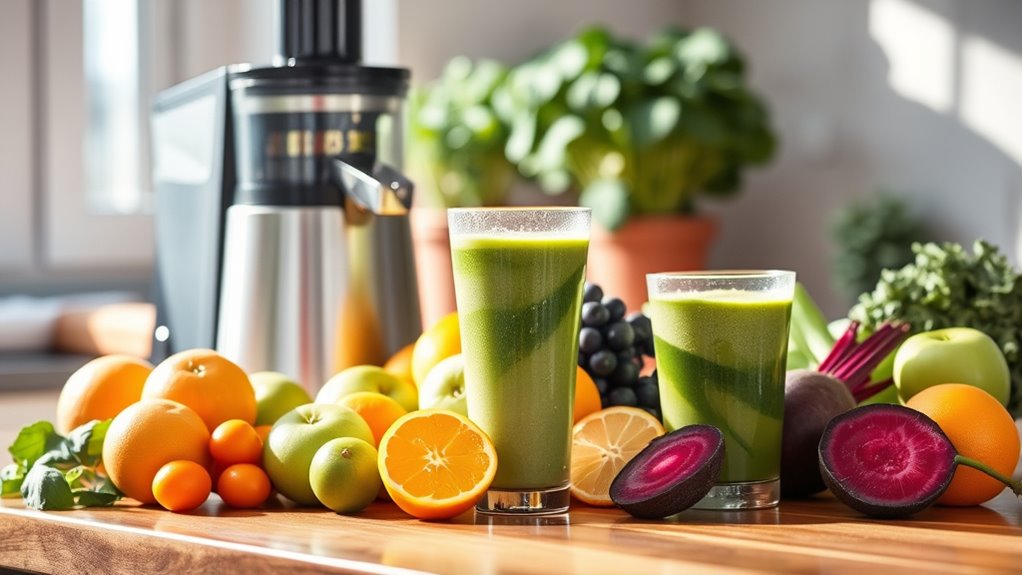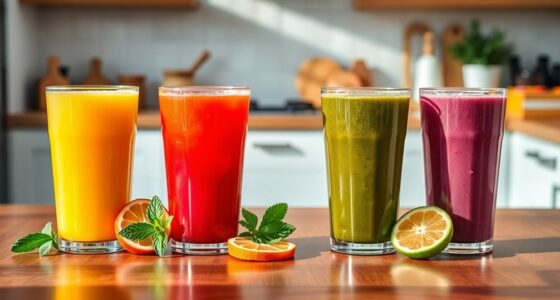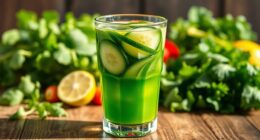Juicing might seem like a quick fix for gut health, but it can actually harm your microbiome. By stripping away about 90% of the fiber, you’re depriving your beneficial gut bacteria of what they need to thrive. This imbalance can lead to increased inflammation and harmful bacteria. Instead of relying solely on juice, you should consider blending or consuming whole foods. There’s a lot more to gut health that you’ll want to understand to make the best choices.
Key Takeaways
- Juicing removes about 90% of fiber, which is crucial for nurturing beneficial gut bacteria and maintaining a balanced microbiome.
- High sugar content in juices can promote inflammation and harmful bacteria growth, negatively impacting gut health.
- Blending fruits and vegetables retains fiber and essential nutrients, offering a better option for supporting a healthy gut environment.
- Pairing juices with whole foods can help balance fiber loss and minimize the adverse effects on gut microbiota.
- A varied, fiber-rich diet is essential for optimal gut health, making whole foods a vital component alongside any juicing practice.
The Promise of Juicing for Gut Health
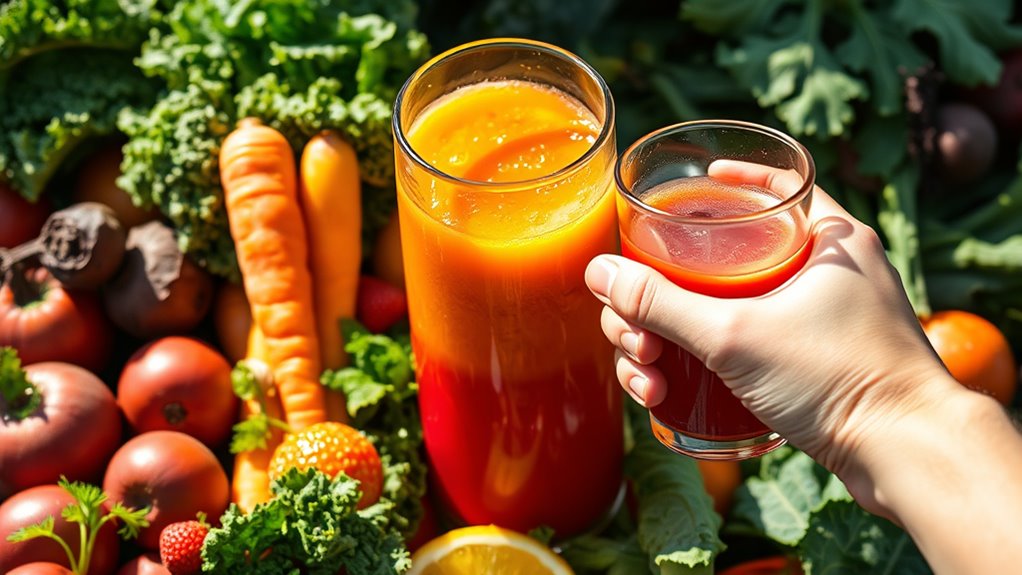
While juicing might seem like a quick fix for boosting your gut health, it often falls short of its promise. Juices lack the essential fiber that supports your gut and maintains a balanced microbiome.
When you juice, you remove about 90% of fiber, depriving beneficial bacteria of their primary food source, which can lead to health issues and increased inflammation.
Plus, high sugar content in juices, compared to whole foods, can promote harmful bacteria growth, undermining your gut health.
High sugar content in juices can encourage harmful bacteria, jeopardizing your gut health.
Instead of juicing, consider blending fruits and vegetables. This way, you retain the fiber that nourishes your microbiome and supports overall health, creating a more beneficial environment for your gut, rather than risking imbalance with sugar-laden juices.
Understanding the Microbiome
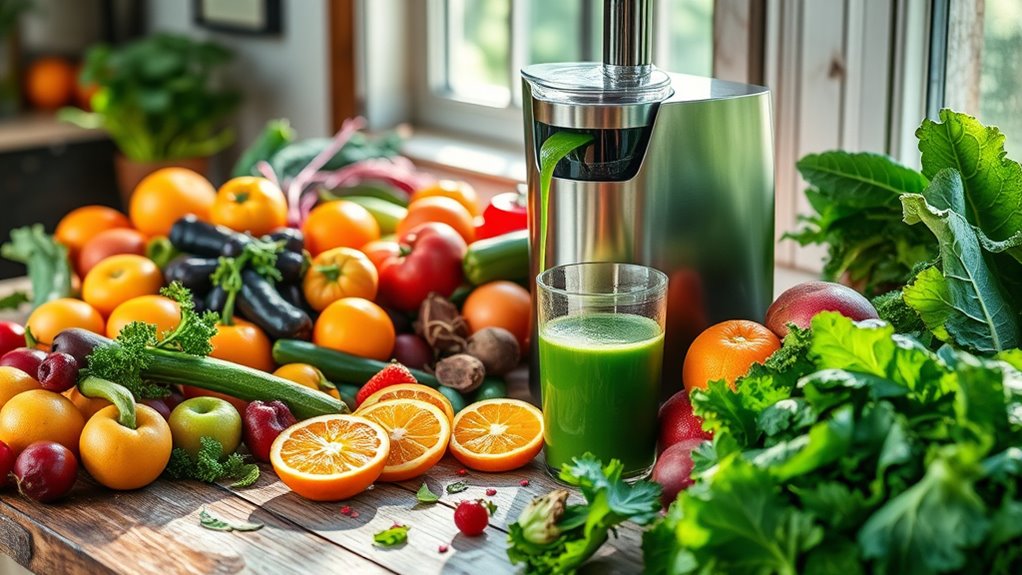
Juicing can disrupt your gut health by removing essential fiber, but understanding the microbiome helps clarify why this fiber is so important. The balance of your microbiome is sensitive to dietary choices, and juicing can lead to significant bacterial shifts.
Here’s why fiber matters:
- It nurtures beneficial bacteria that support gut health.
- A fiber-rich diet helps regulate metabolic and immune functions.
- Juicing may increase pro-inflammatory bacteria, raising inflammation risks.
- Eliminating whole foods can alter your microbiome composition in just three days.
- A balanced diet is vital for maintaining a healthy gut environment.
Incorporating whole foods into your diet guarantees you’re getting the fiber needed to keep your microbiome thriving and your gut inflammation in check. Additionally, including omega-3-rich foods can further support gut health and overall well-being.
Recent Research on Juicing and Microbiomes
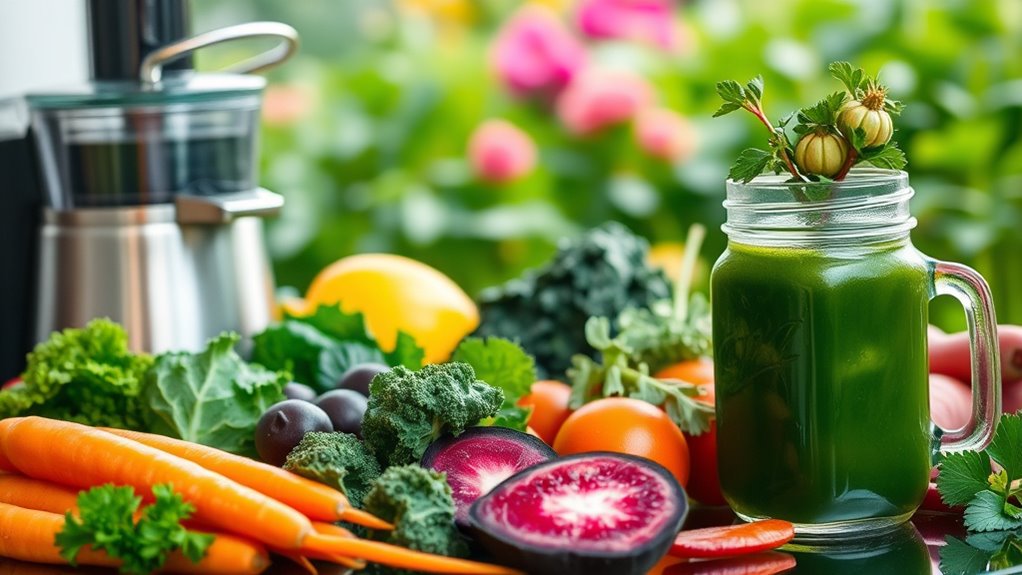
Recent studies show that juicing can considerably alter the bacteria in your microbiome, often leading to an increase in harmful strains.
When you skip fiber-rich whole foods, you miss out on their protective benefits, which helps maintain a healthy gut.
Understanding these shifts is essential if you want to optimize your gut health through juicing.
Juicing’s Impact on Bacteria
As you explore the effects of juicing on gut health, it’s essential to contemplate its impact on the microbiome. Recent studies reveal significant bacterial changes associated with a juice-only diet, including:
- Increased abundance of inflammation-linked Proteobacteria
- Decreased levels of beneficial Firmicutes
- Altered oral microbiome composition within just three days
- Heightened gut permeability and inflammatory responses
- Moderate shifts in gut microbiota in the juice-plus-food group
These findings highlight the importance of incorporating whole fruits and vegetables into your diet.
Juicing removes around 90% of dietary fiber, vital for supporting beneficial gut bacteria. To maintain a balanced gut microbiome, consider a juice-plus-food approach rather than relying solely on juices.
Fiber’s Role in Health
Fiber plays an essential role in gut health, acting as a fuel source for beneficial bacteria that maintain a balanced microbiome.
When you juice, you lose about 90% of that fiber, which can lead to an increase in pro-inflammatory bacteria and a decrease in Firmicutes. This shift negatively impacts your gut health.
Juices often contain high sugar content that can fuel harmful bacteria, potentially causing inflammation and other gut issues.
To support your microbiome, consider blending whole foods instead. This method retains more fiber, helping regulate blood sugar, promote fullness, and nourish beneficial bacteria. Additionally, incorporating green juices can help detoxify the body and support overall well-being.
Aim to consume the recommended 25 to 30 grams of fiber daily to maintain a healthy gut and overall well-being.
The Impact of Juicing on Gut Bacteria
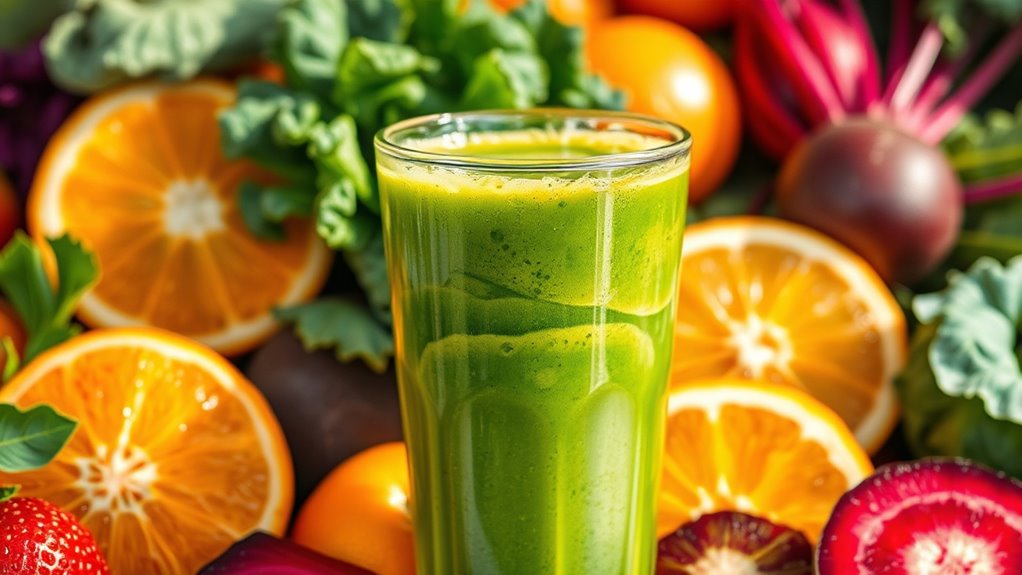
While many people turn to juicing for a healthier lifestyle, it’s essential to understand how it can impact your gut bacteria. A juice-only diet can lead to significant health effects, including:
- Increased inflammation-associated Proteobacteria
- Decreased beneficial Firmicutes
- Disruption of microbiome balance
- Loss of essential fiber from whole foods
- Short-term shifts in gut and oral microbiota
Juicing removes about 90% of the fiber that feeds your beneficial gut bacteria, which is vital for maintaining a healthy microbiome.
This can lead to unfavorable shifts in bacterial populations and increased inflammation within just a few days.
Balancing juicing with whole foods can mitigate these negative effects and support your overall gut health.
Fiber: The Missing Link in Juicing
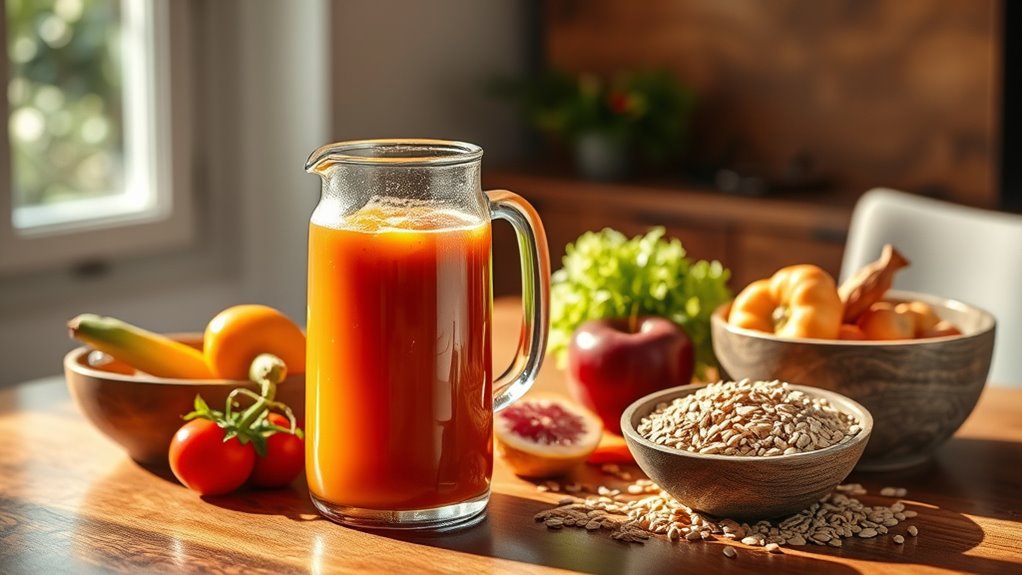
When you juice, you’re missing out on a vital component: fiber. This dietary fiber is essential for maintaining gut health, regulating blood sugar, and supporting digestion. Mixing in unique homemade fruit juice recipes can also help incorporate more whole fruits and vegetables, enhancing both flavor and nutrient density.
Importance of Dietary Fiber
Juicing may seem like a quick way to boost your nutrient intake, but it often strips away the essential fiber that your gut needs to thrive.
Without adequate dietary fiber, you risk compromising your gut health. Here’s why you should consider whole fruits over a juice-only diet:
- Supports beneficial bacteria: Fiber feeds the good bacteria in your gut.
- Enhances microbial diversity: A varied diet helps maintain a balanced gut ecosystem.
- Regulates metabolism: Fiber aids in proper metabolic function and stability.
- Controls blood sugar: It helps manage blood sugar levels, countering the high sugar content in juices.
- Promotes fullness: Fiber keeps you feeling satisfied, preventing overeating.
The American Heart Association recommends 25 to 30 grams of fiber daily—are you getting enough? Additionally, a high fiber diet can contribute to digestive health and overall well-being.
Juicing vs. Blending Benefits
Although many people turn to juicing for a quick health boost, blending offers a more balanced approach by retaining the essential fiber found in fruits and vegetables.
Juicing removes about 90% of fiber, which is vital for nourishing beneficial gut bacteria and supporting gut health. When you blend, you keep that fiber, aiding digestion and helping you feel full, which can assist in weight management.
Fiber regulates blood sugar levels and promotes regular bowel movements, yet most Americans fall short of daily recommendations. High sugar content in juices can encourage harmful bacteria, while fiber-rich blended smoothies stabilize blood sugar and support a healthier microbiome. Additionally, high levels of antioxidants in blended options can further enhance your overall health.
Pairing juices with whole foods or choosing blended options can help detoxify and reduce inflammation.
Impact on Gut Health
Fiber plays a pivotal role in maintaining gut health, and its absence in juice-heavy diets can have significant repercussions. When you rely on juicing, you miss out on essential fiber that feeds beneficial bacteria in your microbiome. This can lead to dysbiosis, increasing inflammation and health risks.
Here are some consequences of a fiber-deficient juice cleanse:
- Decreased diversity of gut microbiota
- Higher likelihood of chronic diseases
- Impaired blood sugar regulation
- Reduced feelings of fullness
- Greater risk of digestive issues
To truly support your gut health, opt for whole foods instead of juices. This way, you’ll nourish your microbiome and promote overall metabolic and immune health while enjoying the benefits of fiber-rich fruits and vegetables.
The Role of Sugar in Juicing
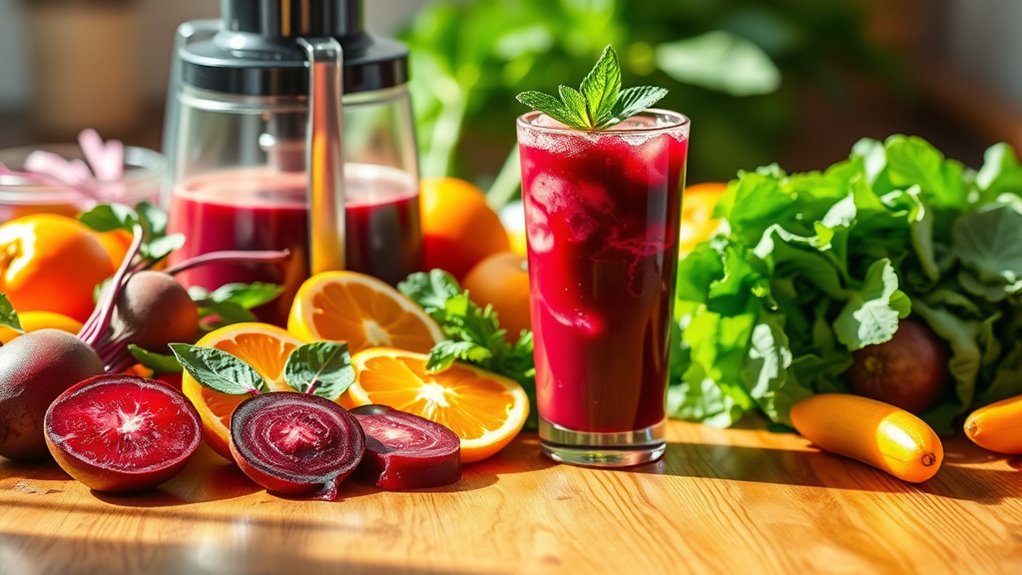
Many people enjoy the invigorating taste of juices, but it’s essential to understand how sugar plays a significant role in their impact on gut health.
Juicing often leads to a significant increase in sugar content in juice, as it retains natural sugars while stripping away fiber. This high sugar consumption can promote the growth of harmful bacteria, leading to microbiome imbalances and inflammation.
Unlike whole fruits, juice with little fiber provides a concentrated source of calories, which can negatively affect overall gut health.
The American Heart Association recommends limiting added sugars to no more than 6% of total daily calories, emphasizing the need to monitor sugar intake from juices.
Ignoring these factors can have negative consequences for your health.
Comparing Juicing and Whole Foods
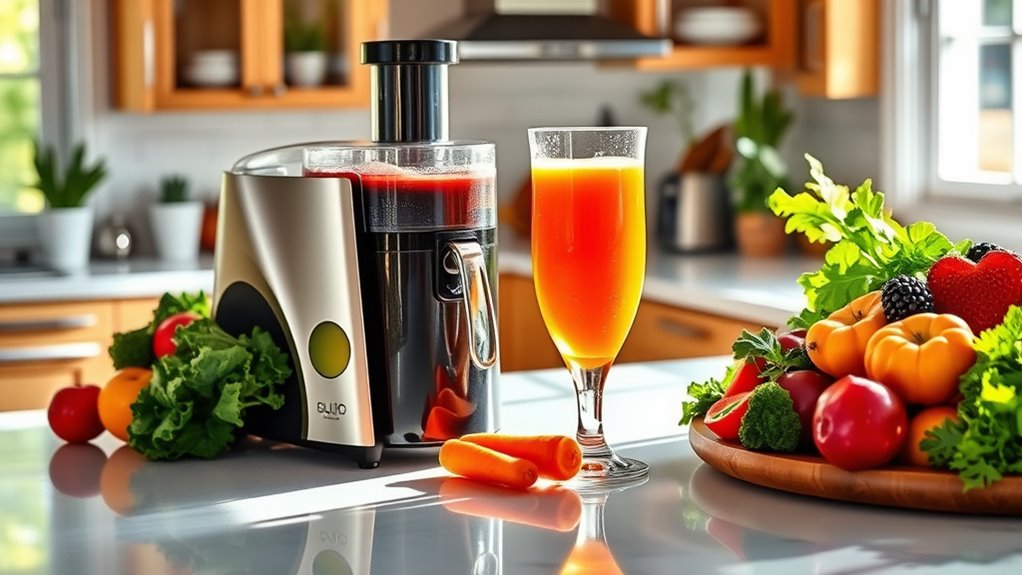
How does the choice between juicing and whole foods impact your gut health? Juicing can detoxify your system, but it often removes crucial fiber, essential for a healthy microbiome.
Whole foods, on the other hand, support beneficial gut bacteria and reduce inflammation. Here’s a quick comparison:
- Fiber Content: Juicing strips away about 90% of fiber, while whole foods are rich in it.
- Bacterial Balance: Juice-only diets can lead to harmful bacteria growth.
- Nutrient Retention: Blending retains more nutrients than juicing.
- Plant-Based Benefits: Whole foods foster a healthier gut flora.
- Sugar Levels: Juices typically have higher sugar content, promoting inflammation.
Additionally, incorporating hydrocolloid technology in your skincare routine can also benefit your overall health by promoting healing and reducing inflammation.
Choosing whole foods can greatly enhance your gut health compared to juicing alone!
Recommendations for Healthy Juicing
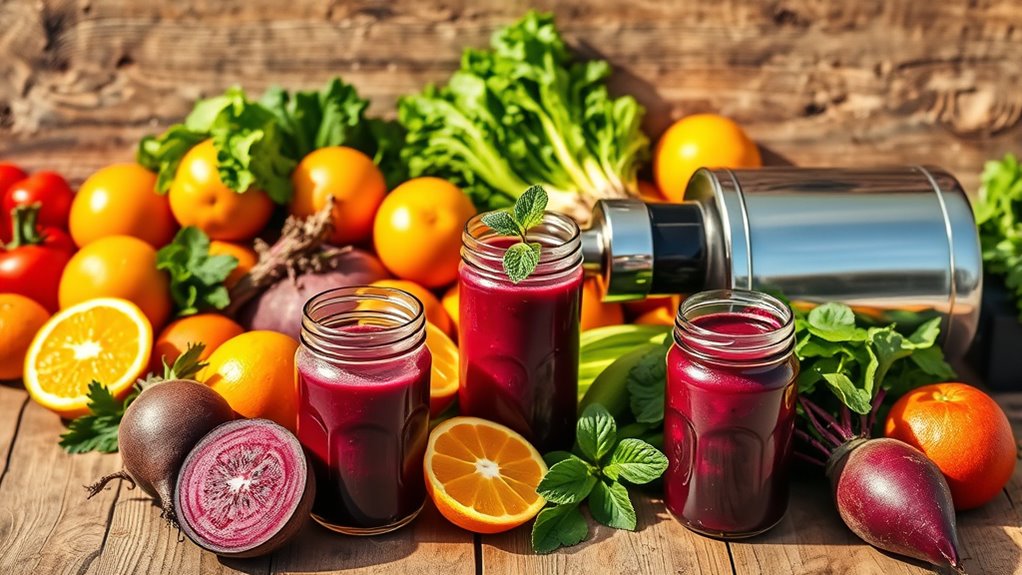
Juicing can be a revitalizing way to incorporate more fruits and vegetables into your diet, but it’s important to do it wisely to support your gut health.
To maximize benefits, pair your juices with whole foods to balance the loss of fiber in whole fruits, which is essential for promoting beneficial bacteria. Be cautious of the high sugar content in juices; consuming them in moderation helps prevent gut imbalances.
Consider blending instead, as it retains the fiber, enhancing your gut and oral microbiome. For ideal health and wellness, incorporate a variety of nutrient-dense foods daily. Additionally, be mindful of the potential side effects of juice detox, as prolonged juicing can disrupt your microbiome and increase inflammation.
Finally, limit juice cleanses to short durations, as prolonged juicing can disrupt your microbiome and increase inflammation.
Cultural Influences on Juicing Trends

As the juicing trend gains momentum, cultural influences play a pivotal role in shaping perceptions and practices surrounding this health craze. You might notice how juicing is often marketed through various lenses, impacting your choices.
Key cultural narratives include:
- Juicing as a detoxification method, promoting quick weight loss
- Celebrity endorsements elevating its status in diet culture
- Social media celebrating the allure of vibrant juices
- Emphasis on concentrated vitamins and minerals over whole foods
- Concerns about the loss of dietary fiber and its effects on gut health and microbiome balance
These narratives can lead you to prioritize liquid diets, sometimes overlooking the importance of fiber-rich whole foods for sustainable health. Additionally, incorporating fresh fruits and vegetables into your juices can enhance their nutritional profile while supporting your gut health.
Stay informed and consider the long-term implications for your gut health.
Making Informed Dietary Choices
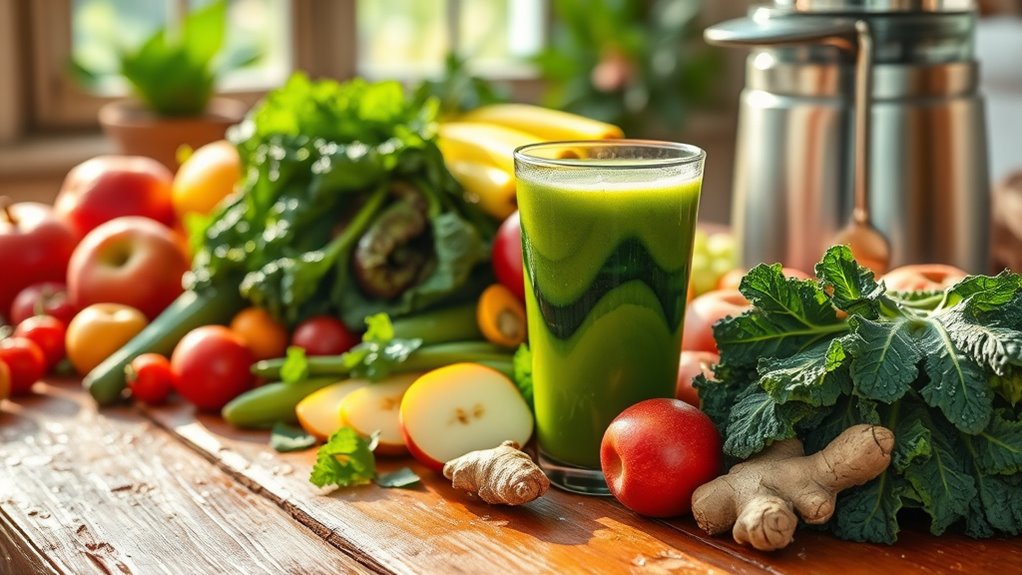
While many people are drawn to the appealing colors and flavors of juices, it’s important to make informed dietary choices that prioritize your gut health. Juicing often strips away dietary fiber, vital for feeding your healthy gut bacteria. Instead of relying solely on juices, consider incorporating whole fruits and vegetables into your diet for ideal fiber intake. Short-term juice cleanses can disrupt your microbiome, increasing inflammation-linked bacteria. Blending, on the other hand, retains fiber and offers a balanced nutritional profile. Here’s a quick comparison:
| Juicing | Blending | Whole Fruits |
|---|---|---|
| Low fiber | High fiber | High fiber |
| High sugar | Balanced sugar | Balanced sugar |
| Short-term cleanse | Daily option | Daily option |
Incorporating raw food diets can also enhance your overall gut health by providing unprocessed nutrients that support a diverse microbiome. Choose wisely for better gut health!
Frequently Asked Questions
Can Juicing Heal Your Gut?
Juicing may not heal your gut as you might hope. In fact, it can strip away essential fiber, which your gut bacteria need to thrive.
Without fiber, you could end up promoting harmful bacteria instead of nurturing the beneficial ones. Plus, the high sugar content in juices might increase gut inflammation.
If you want to support your gut health, consider blending fruits and vegetables into smoothies instead, as they retain the fiber and nutrients.
What Happens to Your Body After 3 Days of Juicing?
After three days of juicing, you might notice significant changes in your body.
Your gut microbiome can shift, with an increase in inflammatory bacteria and a decrease in beneficial ones. You may also experience heightened gut permeability and inflammation, which can lead to discomfort.
Since juicing strips away most of the fiber, you could miss out on essential nutrients that support a healthy digestive system.
What Juice Is Best for Your Gut?
When you’re looking for the best juice for your gut, consider options like green juices made from spinach, kale, and cucumber. These provide essential vitamins while still being low in sugar.
Adding ginger can help with digestion, while a splash of lemon enhances flavor and boosts vitamin C.
However, don’t forget that juices lack fiber, so it’s smart to pair them with whole fruits or veggies to support your gut health better.
What Is the Fastest Way to Restore Gut Health?
You think you can wave a magic wand and restore your gut health overnight? Think again!
To speed up the process, immerse yourself in a high-fiber diet packed with whole fruits, veggies, and grains.
Don’t forget those fermented foods like yogurt and sauerkraut!
Cut back on processed foods and sugars, stay hydrated, and get moving.
Your gut’s gonna thank you for it, and you’ll feel a lot better, too!
Conclusion
Incorporating juicing into your routine can be a game changer for your gut health, like finding the missing piece of a puzzle. While it offers a burst of nutrients, remember that whole foods are equally important for a balanced diet. By making informed choices and blending both methods, you’ll cultivate a thriving microbiome. So, grab your juicer, but don’t forget to savor those crunchy fruits and veggies, too—your gut will thank you!
Cindy thoroughly researches juicing trends, techniques, and recipes to provide readers with practical advice and inspiration. Her writing style is accessible, engaging, and designed to make complex concepts easy to understand. Cindy’s dedication to promoting the advantages of juicing shines through her work, empowering readers to make positive changes in their lives through the simple act of juicing.

